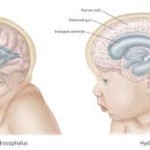
Author Archives: Shuaibu Rabiu
- March 9, 2016
-
- February 11, 2016
-

Hydrocephalus: Water accumulation in brain cavities
Hydrocephalus: Water accumulation in brain cavities
Hydrocephalus refers to accumulation of fluid in the cavities, known as ventricles, within the brain. This excess fluid makes the ventricles big and increases the pressure on the brain.
Normally the Cerebrospinal fluid bathes the brain and spinal column. But if the pressure of the fluid is high it can damage the brain tissues. This condition is more common among infants and older adults.
Causes
Cerebrospinal fluid is produced by tissues lining the ventricles and flows into spaces around the brain and spinal column. It’s normally absorbed by the blood vessels in tissues near the base of the brain.
Hydrocephalus can occur because of the following reasons:
· Obstruction – This is the most common problem.
· Poor absorption – This is less common and occurs due to inflammation of brain tissues
from disease or injury.
· Overproduction – This is little rare.
Symptoms
This varies according to the age of onset.
In Infants: Unusually large head, quick increase in head size, a bulging soft spot on the top of the head. Physical symptoms include Vomiting, poor feeding, irritability, sleepiness, fits, downward fixing of eyes, decreased muscle tone and strength.
In older children: Headache, Blurred or double vision, abnormal enlargement of head, sleepiness, vomiting, poor balance and coordination, seizures. Behavioral and cognitive changes include, Irritability, Personality changes, attention deficit, deterioration in previously acquired skills, like walking / talking.
In middle-aged adults: Headache, Difficulty in remaining awake or waking up, Loss of balance, Loss of bladder control, Vision impairment, Decreased memory and concentration.
In older adults: Loss of bladder control, frequent urge for urination, memory loss, loss of thinking and reasoning skills, walking difficulties, poor coordination or balance, slow movements.
Diagnosis
Neuro examination: The basis of the examination is to judge Muscle reflexes, strength and tone, Sense of touch, eye movement, Hearing, Mental status, Mood and Coordination of movements.
Imaging Studies: Brain imaging tests show enlargement of the ventricles and also identifies the underlying cause of hydrocephalus. These include Ultrasound scan, CT and MRI scans.
Treatment
The following surgical treatments are commonly used to treat hydrocephalus.
· Shunt
· Endoscopic third ventriculostomy
However, before you take any treatment step, please consult your doctor. Please do not start any treatment without consulting your doctor.
Did You Know!
A number of developmental or medical problems can trigger hydrocephalus.
· Developmental abnormality of the central nervous system.
· Bleeding inside the ventricles.
· Uterine infection of the mother like rubella or syphilis.
· Certain other factors can also contribute to hydrocephalus, like below :
o Tumours involving brain and spinal cord.
o Infections involving brain like bacterial meningitis.
o Bleeding inside brain.
o Traumatic injuries to the brain.
- February 1, 2016
-

LASSA FEVER EPIDEMICS/SAFETY METHODS
MODE OF TRANSMISSION:
1.By contact with feces/urine of the mouse
2. Grains mixed with mouse feces
3. Aerosol of these feces
4. Contact with infected and symptomatic persons blood, sweat, urine, semen,saliva or feces.
SIGN AND SYMPTOMS
- Note: Incubation Period: 6-21days
- FEVER: high grade T:38.5-40^C, not responding to conventional antimalarial and antibiotics
- GIT: bloody vomitus, bloody diarrhea, abd pain, difficulty in swallowing(Dysphagia).
- CVS: hypo and hypertension,tachycardia
- RS: bloody cough,pharyngitis(sorethroat)
- Nervous system: Meningitis, seizure
- Others: conjuctivitis-red eyes,redish skin rash,bleeding under skin,headache
- 80% are asymptomatic but the 20% that are symptomatic is always fatal
- Mortality rate:10-15%,coud be 50% during epidermics
SAFETY PRECAUTIONS
HIGH INDEX OF SUSPICION
- Hand gloving
- Regular Hand wash After each patient
- Face mask
- Avoid recapping needles
- Avoid eating in places where you attend to patients
- Clean blood splash, feces or any body fluid with chlorhexidine (JIK)solution
- Avoid rodents at home
- Keep all food items in a sealed container
- Avoid indiscriminate refuse dumping
- Use a air-tight dustbin to avoid rodents
- January 5, 2016
-

Five Ways to Sleep Well and Protect Your Heart
Poor sleep can worsen the risk factors for heart disease. Find out what you can do to improve both the quality of your sleep and how much sleep you get.
What the Experts Do
Just Say No to TV Binge-Watching
“I have to remind myself, just like my patients, to make sleep a priority,” says Johns Hopkins neurologist and sleep specialist Rachel E. Salas, M.D. “It’s so easy to say, “I’ll just catch up on some work for awhile or watch a TV-show-a-thon on my DVR.”
She finds that the simple act of telling herself that sleep is important helps her choose it over other temptations. Also key for her: Being consistent about when she sleeps. “I used to think I could make up for sleep on the weekends, but doing that negatively impacts sleep quality,” she says. Now she tries to have a consistent bedtime and waking time seven days a week.
“Sleep is something all humans do—most not very well,” says Johns Hopkins neurologist and sleep specialist Rachel E. Salas, M.D. When you don’t get enough good-quality sleep for any reason, whether because of an untreated sleep disorder or simply not getting enough sleep, you raise your odds of developing many conditions that can lead to or worsen heart disease.
Poor sleep can cause excess weight gain, for example. “If you’re tired, you’re less active. Too little sleep also affects the hormones ghrelin and leptin, which influence appetite and metabolism,” Salas says. “So even if you eat right and exercise, you can gain weight if you have too little sleep or have an undiagnosed, untreated sleep disorder.”
Sometimes the effects of poor sleep quality are less direct and obvious. Poor sleep can impact mood, which affects work and home life, and can lead to or worsen anxiety and depression, which are risk factors for heart disease. Poor sleep may lead to erectile dysfunction, another common relationship stressor, she adds.
Two common sleep disorders, insomnia and sleep apnea, can lead to other heart risks when left undiagnosed or untreated. Sleep apnea is linked to a host of heart risks, including diabetes, hypertension, arrhythmia, obesity, stroke, and heart failure.
Most people need seven to nine hours of good-quality sleep per night. “Even an extra 15 minutes can make a huge difference,” Salas says. What helps?
1. Look into symptoms of possible sleep problems.
Do you wake up tired, even though you think you got a long night’s sleep? Do you struggle to stay awake when driving or while sitting in a meeting? Does your bed partner say you snore? Do you wake at night and take at least 30 minutes to fall back asleep, three times a week or more?
Talk to your health care provider, who may refer you to a sleep specialist. A formal sleep evaluation may be needed to observe your sleep.
2. Have a consistent bedtime routine.
Try to go to bed and wake up at approximately the same time every night. Wear special sleep clothes (or simply an undershirt and understhorts) rather than sleeping in the same clothes you wore while awake (even if they’re your comfortable jogging sweats). These things provide cues to tell your brain it’s time to sleep, Salas says.
3. Keep potential sleep-stealers out of the bedroom.
“Sleep environment is a huge factor in getting good sleep,” Salas says. Lights and electronics are among the worst offenders. Avoid having a TV or computer in your bedroom, or reading at night with an e-reader 30 minutes before you turn in. If you’re prone to allergies (which can cause a stuffy nose, breathing through the mouth, and a constant need to wake up and drink water), remove the carpets or vacuum them regularly and change bed sheets weekly so dust doesn’t accumulate and bother you. Ask your doctor about taking antihistamines.
4. Drink less, exercise more.
Avoid a nightcap: It’s a myth that alcohol will help you sleep better. Daytime caffeinated beverages matter too. It can take your body six hours or longer to rid itself of caffeine. Getting exercise during the day can help ready you for nighttime sleep. (Just get your health care provider’s OK before starting any new exercise program.)
5. Know that sleep and heart health work both ways.
If you’re already being treated for heart issues, you may experience worse sleep as a result. The timing of medications such as beta blockers, for example, can impact your sleep, Salas says. Pain can also worsen sleep, and a condition such as heart failure can make it difficult to lie flat. Report sleep problems to your heart care team to look for solutions.
- January 4, 2016
-

COMPLIMENT OF THE SEASON TO ALL OUR CLIENTS
ON BEHALF OF THE BOARD OF DIRECTORS, MANAGEMENT AND ENTIRE STAFF OF REEMEE MEDICARE NIGERIA LIMITED, WE WISH OUR CLIENTS HAPPY NEW AND ABUNDANT BLESSINGS



